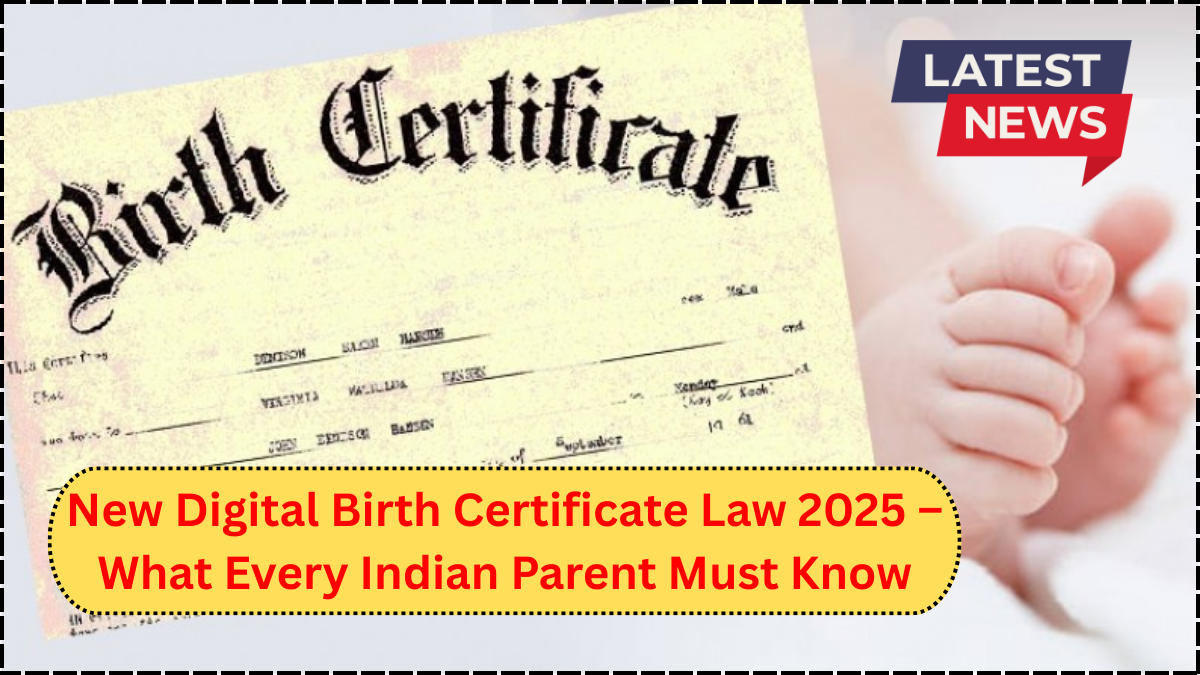India is entering a new era of digital governance, and one of the most impactful reforms of 2025 is the introduction of the Digital Birth Certificate system. This law streamlines how birth records are created, stored, and accessed across the country. For every Indian parent, especially those expecting or planning for a child, understanding the new birth registration rules is no longer optional—it’s crucial.

Here’s everything you need to know.
What Is the Digital Birth Certificate in India?
Under the Digital Birth Certificate India initiative, physical birth certificates are being replaced with a unified digital version. This new digital certificate will serve as a single source of truth for an individual’s birth details, including date, place, and parentage. It will be digitally signed and made accessible through official portals and mobile apps.
The system is part of a broader digital identity framework, seamlessly linking with Aadhaar and other public databases to ensure accuracy, traceability, and interoperability.
What Has Changed in the Birth Registration Process?
The new birth registration rules under the 2025 law introduce several changes:
1. Mandatory Digital Entry Within 21 Days
Parents or guardians must report a birth within 21 days to the local authority via an authorized digital platform. Hospitals, nursing homes, or midwives are required to register the birth in real-time using a centralized online system.
2. Unified National Birth Database
The system feeds into a national-level birth registry, eliminating state-wise variations and duplicate entries. Once registered, the digital birth certificate becomes accessible across India and remains valid for life.
3. Integration with Aadhaar
Immediately after registration, the child is assigned an Aadhaar number. The Aadhaar-birth linkage enhances identity verification across healthcare, education, and welfare systems.
Benefits of the Digital Birth Certificate System
This shift isn’t just bureaucratic—it directly impacts how citizens access services.
Effortless Access
Forget long queues and paper-based certificates. Parents can download the digital birth certificate anytime through DigiLocker or the Civil Registration System (CRS) portal.
Tamper-Proof and Verifiable
Digital certificates are secured by blockchain-style authentication and can be verified instantly by schools, embassies, and employers—reducing the risk of fraud.
One-Time Registration, Lifetime Utility
The new system means a single digital certificate will serve throughout the person’s life—for admissions, passport applications, voting, and even pension claims.
Responsibilities for Indian Parents in 2025
To ensure smooth registration, here’s what parents must prepare:
Ensure the hospital/clinic is registered with the local civil authority and capable of digital reporting.
Provide accurate parental information during admission. This includes Aadhaar numbers, which are now part of the digital record.
Track the status via the CRS portal or DigiLocker. If the hospital delays, parents must act within 21 days to avoid penalties or complications.
Challenges and Concerns
No new system is without hurdles. Here are a few concerns:
Digital Divide: Remote or rural areas may lack internet infrastructure, potentially delaying digital registrations.
Data Privacy: While Aadhaar integration improves efficiency, some critics raise concerns about how securely personal data is stored and shared.
Public Awareness: Many citizens are still unaware of the new birth registration rules, which could lead to missed deadlines and unregistered births.
The government has launched awareness campaigns and multilingual support helplines to bridge these gaps.
How to Apply for a Digital Birth Certificate in 2025
Step-by-Step:
Hospital registers the birth online within 21 days.
Parents receive a notification with login credentials to the CRS portal.
Certificate is digitally signed and stored under the child’s Aadhaar-linked profile.
Access and download through DigiLocker or directly from the CRS.
No physical copies are required unless explicitly requested.
Frequently Asked Questions (FAQ)
Q1: Is a physical copy of the birth certificate still valid?
Yes, but only certificates issued after 2025 in digital format will be considered the official version. Older physical ones will remain valid but can be converted digitally.
Q2: What if my child was born at home?
Home births must be reported by the family or attending midwife within 21 days through the local municipal authority’s digital portal.
Q3: Can NRIs register their child’s birth under this law?
Yes. Indian embassies and consulates now have access to the CRS system and can register births digitally.
Q4: Will schools accept only digital birth certificates?
Yes. Schools, universities, and other institutions will be required to verify birth details using the digital system.
Q5: Is Aadhaar compulsory for registration?
While not mandatory for the newborn, Aadhaar of parents is needed to complete the digital authentication process.
click here to learn more